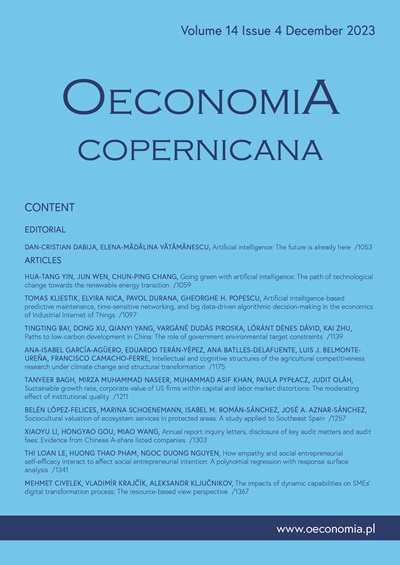A moderated mediation model of perceived barriers, entrepreneurial self-efficacy, intentions, and behaviors: A social cognitive career theory perspective
IF 10.8
1区 经济学
Q1 ECONOMICS
引用次数: 4
Abstract
Research background: Although perceived barriers are considered one of the central constructs in entrepreneurship research, most previous studies only examine the direct effect of perceived barriers on attitudes and/or intentions to become entrepreneurs. Little attention is paid to how perceived barriers can weaken individuals? translation from entrepreneurial intentions to actual behaviors. Purpose of the article: This research aims to adopt the Social Cognitive Career Theory and a moderated mediation model to bridge the entrepreneurial intention-action link, investigate the moderation effects of perceived barriers on this link and the mediation path from entrepreneurial self-efficacy to entrepreneurial behavior via entrepreneurial intention. Methods: A valid sample of 1,698 Vietnamese respondents with real working and business experiences through the stratified random sampling with three stages and PROCESS macro approach have been used to examine the moderated mediation effect of perceived barriers on the entrepreneurial self-efficacy-intention-behavior linkages. Findings & value added: The findings of this study shed new light on entrepreneurial literature by applying the Social Cognitive Career Theory to illustrate the moderated mediation effects of perceived barriers and entrepreneurial intention in the relationship between entrepreneurial self-efficacy and entrepreneurial behavior. Particularly, the translation from entrepreneurial intentions into start-up actions was found to became weaker when perceived barriers was high. Moreover, perceived barriers were also found to negatively moderate the indirect effects of entrepreneurial self-efficacy on start-up behaviors through entrepreneurial intentions. The findings of our study also provide several essential recommendations for policymakers and practitioners to encourage individuals? business venture creations and enhance entrepreneurial ecosystem.感知障碍、创业自我效能、意图和行为的调节中介模型:社会认知职业理论视角
研究背景:尽管感知障碍被认为是创业研究的核心结构之一,但以前的大多数研究只考察了感知障碍对成为企业家的态度和/或意图的直接影响。很少有人注意到感知障碍是如何削弱个人的?从创业意图到实际行为的转化。本文的目的:本研究旨在采用社会认知职业理论和调节中介模型来桥接创业意图-行动的联系,研究感知障碍对这一联系的调节作用,以及通过创业意图从创业自我效能到创业行为的中介路径。方法:采用三阶段分层随机抽样和过程宏观方法,对1698名有实际工作和商业经验的越南受访者进行有效抽样,检验感知障碍对创业自我效能-意向-行为联系的调节中介作用。研究结果和附加值:本研究的研究结果通过应用社会认知职业理论来说明感知障碍和创业意图在创业自我效能感和创业行为之间关系中的调节中介作用,为创业文献提供了新的视角。特别是,当感知障碍较高时,从创业意图转化为创业行动的能力会减弱。此外,感知障碍也被发现通过创业意图负面调节创业自我效能感对创业行为的间接影响。我们的研究结果还为政策制定者和从业者提供了一些重要建议,以鼓励个人?创造商业风险,增强创业生态系统。
本文章由计算机程序翻译,如有差异,请以英文原文为准。
求助全文
约1分钟内获得全文
求助全文
来源期刊

Oeconomia Copernicana
ECONOMICS-
CiteScore
13.70
自引率
5.90%
发文量
26
审稿时长
24 weeks
期刊介绍:
The Oeconomia Copernicana is an academic quarterly journal aimed at academicians, economic policymakers, and students studying finance, accounting, management, and economics. It publishes academic articles on contemporary issues in economics, finance, banking, accounting, and management from various research perspectives. The journal's mission is to publish advanced theoretical and empirical research that contributes to the development of these disciplines and has practical relevance. The journal encourages the use of various research methods, including falsification of conventional understanding, theory building through inductive or qualitative research, first empirical testing of theories, meta-analysis with theoretical implications, constructive replication, and a combination of qualitative, quantitative, field, laboratory, and meta-analytic approaches. While the journal prioritizes comprehensive manuscripts that include methodological-based theoretical and empirical research with implications for policymaking, it also welcomes submissions focused solely on theory or methodology.
 求助内容:
求助内容: 应助结果提醒方式:
应助结果提醒方式:


